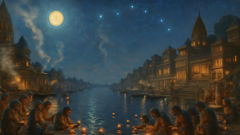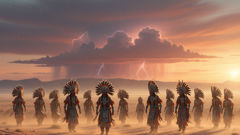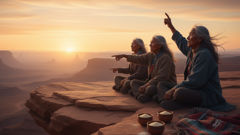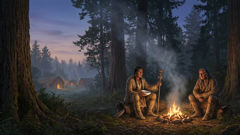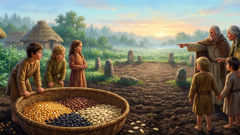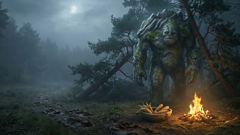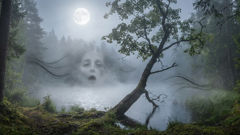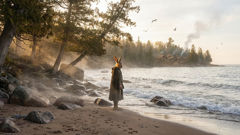Introduction
The year the village stopped looking up, the monsoon forgot its name. Clouds gathered like reticent pilgrims and went away without speaking; wells sank to the depth of old stories; even the parakeets’ calls sounded like dry beads rattling. People began to measure days not by sunrise but by cracks extending across the fields. Yet on the temple roof, where the wind still remembered how to cool a brow, a young cartographer named Devika unfolded her grandfather’s star map and raised a brass compass that had turned warm from her palm. She’d learned to draw lakes that had long gone to dust and roads that still argued with mountains, but she’d never mapped the silence that drought makes in a human voice. On that roof, night wasn’t empty. The Big Dipper balanced above the neem tree, seven ladles of light, known to her elders as the Saptarishi—Seven Sages—steady as old advice. Her grandmother used to say that when the ladle tilted, it poured wisdom onto those who listened. Devika watched the constellation pivot, the handle pointing where the wind might come, and felt a tug not from the earth but from above it. The stars were speaking in a language older than rain. One whisper named companionship; another, restraint; a third, fire tempered to seed. She didn’t know how to translate a whisper into a map, but she knew the first step of any journey is the willingness to draw a blank space and call it an invitation. At dawn she slung a rolled vellum, a charcoal case, and a gourd of well-guarded water. The elders had no blessing to spare, only a looked-down silence that stung like pepper. Devika threaded the lane past doorways garlanded with last-year’s faith and slipped onto the road, letting the faintest trail of coolness from the north guide her feet. Somewhere between grain of sand and grain of star, the Seven Sages waited with their palms lifted, not to bless only, but to point.
The Village That Forgot the Stars
Devika’s first miles were measured in dust and stubborn noon. By evening the road found a mango grove that threw its shade like a shawl, and beyond it, a low rise where the horizon let itself be read. She lay back on packed earth, framed by grass and beetles, and waited for the sari of dusk to be drawn. The Big Dipper rose where the wind thinned. She recalled her grandmother’s finger tracing from Merak to Dubhe, the line that points to the North Star, Dhruva—anchor of the sky’s wheel—and felt the old arithmetic of navigation settle into her bones. Somewhere near the village boundary, she heard laughter, not human but the shy chime of a river unsure of its course. Following it, she found a ribbon of water the maps had forgotten and a man seated on a stone, his beard catching moonlight like soft frost. He was neither young nor old; he was the age of patience. Beside him stood a woman with eyes steady as iron filings in a magnet’s field. “You’ve come for a map,” the man said without introduction. “We have none. We have a way.”
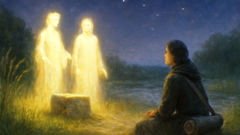
They called themselves Vashistha and Arundhati. Devika had heard those names in stories told in the lean months when memory is a pantry. Vashistha’s voice seemed woven from reed and thunder, and Arundhati’s presence was so precise that even the mosquitoes reorganized their flight around her. “People think stars are distant lamps,” Arundhati said, “but we’re more like mirrors. Look at us long enough, and you remember your face.” Vashistha pointed upward to a faint companion star beside one of the ladle’s brighter flames. “Some eyes never see her. They’re busy counting spoons. If you look until your breath quiets, you’ll notice that no light stands alone. Companionship is a law of motion.” Devika squinted; the faint double resolved and softened, like a promise seen for what it is: not an escape but a tether. Vashistha handed her a fresh-cut bamboo staff etched with seven small notches. “The world is a wheel. This staff is a spoke. Walk with it. Each notch is a question you’ll learn to phrase with your feet.”
Morning found her on a border road between two villages that had forgot how to greet each other. A small procession of carts clogged the passage, oxen blowing patient steam. Voices rose like dry brush catching. A tall figure stepped from the roadside tamarind, his posture alert the way a bow is alert even at rest. “A road is a law that people can obey without fear,” he said. “Or it’s a crack where fear grows.” He introduced himself as Vishvamitra. Devika recognized the name the way the ground recognizes rain. He stooped, drew a line with a twig in the dust between the arguing cart drivers, and said, “You can pull, you can push, or you can widen.” He handed the twig to each in turn; the men hesitated, then bent to draw new arcs that turned the single tight path into a braided track. “A kingdom isn’t a wall,” he murmured to Devika as the carts eased forward. “It’s a reach of possibility.” The dust rose and settled. “Imagination,” he added, “is courage that’s learned to build.”
They walked together to a half-ruined stone well cupped by acacia trees. Vishvamitra sat on its lip and said, “People sing of rivers and forget the dry wind that buffed their banks smooth. They chant names and forget the mouth that has to speak those names even when it hasn’t eaten. You’ll meet others who’ll talk about the weight of a seed and the way fire behaves when it’s treated as a god. Listen to them; then draw a map that people can step into without tripping on their past.” Devika drank carefully, the water tasting of coin and cloud. The staff was comfortable in her hand now, as if it had been waiting in the bamboo all along.
On the third night she camped near a shrine where a brass bell hung silent and children had scratched constellations into packed earth with pebbles. A slow wind passed that smelled of fenugreek and approaching change. Vashistha’s voice returned like the low note a conch keeps in its shell; he spoke of household fires tended and guests seated. Arundhati spoke of choosing to walk beside, not ahead. Vishvamitra spoke of building a road across one’s own stubbornness. Devika sketched the three of them as three strokes of a river—steady channel, faithful tributary, daring meander—and felt something uncoil along her spine. The village memory of forgetting seemed less heavy now, less like a curse and more like a door that had stuck from disuse. The Big Dipper tipped slightly west as if pouring a small measure of resolve into the cup of the night. She slept with the staff across her lap, dreamt of seven lamps, and woke to the sound of camels, the desert’s patient punctuation marks, moving east like a crescent that had learned to walk.
Gods in the Dust and the Listening Forest
The road lifted into a land that treated light like a negotiator. Dawn came as a pale coin slipped under the door of the horizon. Devika entered the Thar’s outer hush, where wind spelled its secret alphabet across dunes and shade was the local currency. She followed caravan prints filled with last night’s starlight, counted beetle tracks like commas between long sentences of sand, and listened for a voice that didn’t arrive as sound. Near a salt pan she found an old man kneeling to adjust the strap on a camel calf too small for its burden. His hands were study and mercy in equal parts. “Kashyapa,” he said when Devika approached, as if he’d just remembered his name from a time before people wore them. Around him moved goats with hair like torn clouds, a dog with the patience of a monk, and a desert fox convinced of its own divine lineage. “Everything that breathes thinks it’s central,” Kashyapa said. “It’s not wrong. It’s incomplete. The center is a shared agreement.” He showed Devika how a caravan rests under the scant shade of a khejri tree, how a water bag cools itself in its own sweat, how even the harsh thorn doubles as a knitting needle that mends the wind’s torn cloth by slowing it. “Stewardship isn’t pity,” he added, stroking the calf’s neck. “It’s an exchange of promises. You promise to care, and the world promises to go on including you.”
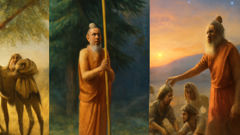
Kashyapa walked with her until the dunes flattened into scrub and the earth began whispering of wheat again. They came to a hamlet flanked by two cisterns, one empty, one hoarding shadows. A brackish pool held a single lotus, its courage an affront to the sun. Kashyapa drew seven circles in the dust with his staff—she noticed he carried a twin to hers, seasoned by more years—and asked three children what each circle meant. One said “moon,” another “bride’s bangle,” the third, with sand on his lip, said “seven different kinds of thirst.” Kashyapa laughed, a sound like a dry leaf revealing its veins. “We get thirsty for water, for praise, for justice, for yesterday, for next year, for control, for surrender. Learn to drink the right one at the right time.” He taught Devika how to judge the taste of a well by listening to the sound a pebble makes on its way down, how to find a trail not by what appears but by what refuses to. “Look for the grass that fails to kneel,” he said, “and you’ll find the foot that passed.” When a dust storm rose, he wasn’t hurried. He showed her how to turn away, how to face the east with her back to the west, how to let her shawl take the sand’s fury while her eyes stayed useful. “The earth is full of tests,” he said. “None of them are trying to humiliate you. They’re trying to keep you honest.”
From scrub to grove is a kind of reincarnation. The desert gave way to thorn forest, which thickened into deodar and chir. The air changed its register. It smelled of damp stone and whatever it is that moss prays for. The mountains didn’t announce themselves; they accumulated, ridges like ribs of sleeping beasts. Devika camped beneath a canopy that turned moonlight into powdered milk. A song threaded the trees, so modest it could have been the thought of a bird, or a memory stalling on the cusp of being remembered. Atri stepped into the small clearing the way a chord steps into silence, unafraid to be heard. “You measure by length,” he said, “but some distances are solved by rhythm.” He tapped her staff: tak, tak, ta-tak, tak. “Time isn’t a line you fall along. It’s a pattern you learn to join without tripping.” He taught her to hear the counting river makes on its own chattering stones, how to notice that a hill keeps your secret a beat longer than a valley does. “When you walk,” he said, “you drum the earth. When you sleep, the earth drums you. The question is, can you find the beat that makes you worth listening to?”
They climbed together to a lip of rock with a sky as close as the inner wall of a bell. Atri told tales the way rain tells the ground it loves it: specific, generous, unwilling to leave stones entirely unkissed. He spoke of a poet who learned to harvest a season without cutting a single stalk because he’d mastered the sequence of care, of a widow who eased her village’s grief by saying the names of each loss on beats that matched the breath of those who mourned. “You won’t always be able to give people water,” Atri said. “Sometimes you’ll only be able to teach them where to stand so the dew finds them at dawn. That too is a gift.” The Big Dipper turned slowly above the treeline, conducting crickets, with Orion’s sheath distant and patient, waiting for winter’s cue. Devika’s heart, which had been a sack of coals since she left, throbbed now with a steadier ember. “Patterns,” she whispered into her shawl. “Patterns or I get lost.”
The forest opened onto a river you could hear long before you could trust it. Its surface riffled against itself where a dam of stones had been arranged to slow it. Beside the water lay a spare settlement, its fields short of green but not of hope. A man stood ankle-deep, his dhoti wet, hands cupped to scoop both water and light. “Gautama,” he offered, and his name felt like a tree becoming voice. He beckoned her into the current. “Restraint,” he said simply, “isn’t refusal. It’s generosity practiced toward the future.” He explained how the villagers decided against a large dam that would’ve punished the downstream farms, choosing instead a mosaic of low weirs that asked the river for patience and gorgeously received it. He pointed to a stretch of bank where the soil had sunk under smug hooves. “We’ll move the cattle upstream every three days,” he said. “The earth forgets too, but in a way that heals.” Devika helped carry stones; the river wrote polite vowels around her shins. She watched how Gautama hired the loudest complainer to hold the measuring rope, converting a habit of noise into a habit of care. “Justice isn’t a stiff thing,” he told her as they unloaded a cart of baskets. “It bends without breaking when it remembers everyone’s weight.” In the evening, women came with nightjars nested in their quiet, and the settlement raised a small fire. No one shouted. Even the children played a gentler game, tossing pebbles into each other’s palms as if rehearsing the logic of sharing.
Days gathered into a garland. Devika’s staff bore the pressure marks of new knowledge; the notches along its length didn’t glow, and yet sometimes her hand warmed when she held a particular one as if the bamboo remembered a certain voice. Kashyapa’s circles in the dust stayed with her, seven thirsts that took turns knocking on her mouth. Atri’s rhythm made her step different. Gautama’s restraint argued softly with her urge to fix everything fast. At dusk, the constellation scooped the dark and poured again. Devika drew by firelight: roads that widened for egos to shrink, cisterns that asked for patience, terraces like held breath across hillsides. On a ridge at the edge of the forest, she looked back. The desert’s page had been turned. Ahead waited a town that braided three roads and a rumor of snow on the far rim of the world. Somewhere in the road’s braided center, another sage would be waiting with a lesson like a whetstone—meant not to blunt her, but to set her edge for what the mountains might ask.
Fire in the North and the Circle Complete
The town held a market like a conversation where nothing wanted to end. Brass plates blinked like patient suns; cardamom perfumed the edges of argument; a flute dared to weave through the grocer’s loud arithmetic. To the north, the mountains declared themselves at last, their white speech urgent but not unkind. Devika found a blacksmith’s quarter where hammer blows struck sparks with the discipline of monks ringing wake-up bells. A man stood at the anvil with a focus that narrowed the world to a blade’s width. “Jamadagni,” he said over the hiss of quenching water. He wasn’t forbidding, but he made the air attentive. “Fire is a son of the house,” he said, holding a glowing bar with tongs. “If you treat him like a stranger, he’ll burn you for the insult. If you pamper him, he’ll grow cruel. Set his chores; he’ll become a civilized light.” He showed Devika how to shrink an iron’s red to orange to a negotiated gold, how to shape a ploughshare whose hunger is for earth alone. When a youth scorched a piece, Jamadagni didn’t frown; he made him grind the lesson out on a stone until the arm remembered what the brain claimed to know. “Anger’s the same,” he told Devika when the day folded toward evening. “It wants to be a tool. If you make it a master, it will insist on building a temple to itself.” He crafted a slim iron tip and fitted it to her staff, making it a walking spear not for war but for anchoring in scree or testing river depth. “The world isn’t trying to kill you,” he said, handing it back. “It’s trying to see if you’re prepared to be its student.”
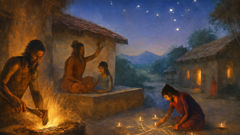
They climbed to a terrace where cabbages had been planted in a geometry that would’ve pleased a compass. Terraces are mountains wearing their responsibilities on their sleeves. Jamadagni pointed to a fresh furrow. “Strength isn’t loud,” he said. “It’s accurate.” He told a story about a village that learned to measure anger by the time it took to relay a bucket of water across the square. At first, people sloshed and spilled; then they learned to pass with two hands and with their eyes looking where the bucket would be next. “That’s discipline,” he said. “Seeing next clearly enough not to trip over now.” That night, under shawls pricked by frost and constellations, Devika dreamed of a forge inside a glacier, a place where heat and cold bowed to the same elder. The Saptarishi held position like a committee of patience, unbribable, exacting, kind.
The road curved east, then north again, then decided to be honest and go straight toward the snow’s blunt insistence. At a broad saddle between two ranges stood a cluster of buildings that listened even when no one spoke. Low roofs, whitewashed walls, a flag that knew ten winds by their first names. Children recited vowels that tasted of ghee and chalk. In the simplest hall, a man in cotton and silence looked up from a copper plate where his finger had been sketching a spiral. “Bharadvaja,” he said, and Devika’s shoulders relaxed as if she’d set down a pack she hadn’t noticed she was carrying. “We breathe in,” he said, “and the world arrives. We breathe out, and we arrive back to it. Between the two is a school.” He led her up a stair where the sky could be read like a primer. “Every lesson takes two breaths,” he said. “One to take in, one to release what you don’t need.” He assigned Devika the lightest homework she’d ever received and the most difficult: to sit for one hour and call a single thought by its correct name. She chose “fear of failing her village” and watched it like a patient watches a kettle, noting when it tried to pretend it was “concern,” when it disguised itself as “planning.” “‘Correct naming reduces noise’ is a quiet law,” Bharadvaja said, not unkindly. “If you know a cloud for its water and not for your story about it, you’ll farm better. If you know a story for its insistence and not for your nostalgia, you’ll teach better.” He took her to the granary where bags rested in the peaceful geometry that follows trust. “Hospitality is curriculum,” he added. “Eat with those who disagree with you and watch the size of your vocabulary increase.”
Together they stood on the school’s roof as the afternoon thinned. Bharadvaja pointed to the north where the sky held a pin you could hang history upon. “Dhruva,” he said. “The North Star. The rest of us turn. He points.” Devika traced from the bowl of the Big Dipper outward to find that stalwart nail of night. “You’ll need him,” Bharadvaja said, “when the last leg of a journey convinces you that legs aren’t a good idea.” He handed her a small clay tablet with seven grooves and a soft charcoal nub. “Keep a weekly calendar that begins with the sky,” he instructed. “Make the ground your second draft.” Devika felt like a student who had at last realized the teacher’s questions were not traps but invitations to build a bridge she’d cross every day for the rest of her life.
With Jamadagni’s tempered courage under her ribs and Bharadvaja’s breath-wise thinking in her throat, she began the descent back toward the plains. The staff clicked on stone, sang on packed dirt, whispered in grass. The Big Dipper shifted with the season’s new grammar, leading by the absence of hurry. Devika took roads that seemed to remember her feet, passed a shrine where someone had hung a bell that wanted not to be rung but to be seen restraining itself, paused at a pond where egrets practiced stillness so severe that the fish mistook it for cloud. On the seventh evening of the seventh week since she left, she saw her village before she believed it: same houses, same neem that made summer survivable, same temple roof that had been her first telescope. The people gathered the way people do when they’re afraid someone has become different enough to not come back inside their circle. Devika stood beneath the lintel of the council house and unrolled her maps.
She didn’t speak first of sages. She spoke of roads widened by kindness so carts could pass, of the seven thirsts and which to quench when, of singing to fields in the rhythm that makes seed want to live. She told them about the river set free to be polite and consequently plentiful. She told them about the blade that preferred soil to argument, about the school where breath did its simple work and learning inhaled and exhaled without drama. When someone scoffed, she gave him a measuring rope. When someone asked for proof, she placed a pebble on their open palm and asked them to name it correctly. “Stone,” they said. “Weight,” she smiled. “Responsibility,” they admitted after a beat. She hung her clay tablet in the council room and drew the Saptarishi’s shape in the upper corner. “When the ladle’s handle points to the neem, we move cattle to the north pasture. When it sinks toward the banyan, we clean the wells. When the bowl tips its lip toward the east, we mend the bunds before the first wind remembers rain.” They laughed, some because they understood, others because laughter is what communities do when change sits down at their table.
Monsoon came as a letter addressed correctly at last. The first drops stitched the dust to its own destiny; the second wrote the old name of the pond on her mother’s face. Children ran with bowls, catching sky water the way they once caught the last drops of an argument. The elders found themselves climbing the temple roof not to scold pigeons but to be told by stars where they were. On a night when lamps floated down the lane to the river, Devika stood with the staff resting and watched the ladle lift. She spoke to the invisible council—Vashistha and Arundhati, Vishvamitra, Kashyapa, Atri, Gautama, Jamadagni, and Bharadvaja—thanking them for hosting her in landscapes made of advice. The seven notches on her staff did not glow, no miracles were asked to perform themselves, and still a miracle occurred: people began to look up again not out of desperation but out of habit.
In the harvest months, they struck a festival the village had never needed until it did. They called it the Night of the Seven Lamps. Each family lit one small terracotta diya and set it upon a drawn map of the sky chalked on the square. Children learned to find the faint companion star near Vashistha and practice the art of seeing what reluctance hides. Farmers marked their calendars by the arc the ladle traced at dusk. The blacksmith laid his new ploughs at the edge of the square, and no one argued about whose came first; they were all pointed the same direction. When the dry season returned—as it always would, because balance is a covenant not a trick—there was water in the cisterns, not enough to brag about, enough to be decent. When quarrels rose like an afternoon dust devil, someone would draw a line, widen the path, and insist the road be not a crack but a promise. When the world felt too loud, a child would tap a staff—tak, tak, ta-tak, tak—until even fear had to learn the beat.
One late night, Devika climbed again to the temple roof. The village breathed like a single animal sleeping well. The Big Dipper held its post; the North Star kept its vow. She traced the line again—Merak to Dubhe—counted out five measures and then the little jump to the fixed light. “There,” she whispered, not to a place but to a trust. She realized the sages had not handed her commandments carved in someone else’s stone. They had offered a way to hold the world that trusted the world to be holdable. She watched the Saptarishi pour the dark into the darker, a steady rotation that taught her the last lesson: wisdom isn’t a story that refuses to end; it’s a story that knows how to continue without applause. In that ongoing sentence, the village was a good word. Her staff leaned by the parapet, a spoke that had learned it was part of a wheel, and the quiet rang like a bell that had discovered a better way to sound—by helping the air remember it had always been music.
Conclusion
In the seasons that followed, Devika drew maps people could fold into their pockets and into their days. A road widened here, a terrace corrected there, a weir that asked less of the river and more of time, a market that remembered to argue with courtesy. She taught children to find Arundhati’s modest star and to be friends who walk beside; she taught farmers to hear a field’s rhythm before confiding seed; she taught the council to measure anger by what it accomplishes rather than by how it feels. The Saptarishi were no longer distant decorations but a working calendar, a set of living metaphors the village could depend upon as steadily as they did on sunrise. Travelers who stopped for water learned the Night of the Seven Lamps and carried it away, and soon nearby hamlets were chalking their own skies on their own squares. When drought visited again—as all guests do, sometimes unwelcome—its chair at the table was smaller. It had to speak after Stewardship and before Patience. Above it all, the Saptarishi swung with grave joy, big as a promise kept. The legend people began to tell wasn’t about an era when the Seven Sages saved a single village, but about a habit of looking up that kept saving people in quiet increments. They said that wisdom tasted like the first sip after a day in the fields: common, astonishing, easy to forget until it returned. And when strangers asked where the map to such wisdom could be bought, Devika smiled and tapped the sky’s wheel with the tip of her staff. “There,” she said, no prophet, only a neighbor with open hands. “The price is attention. The road is yours.”

